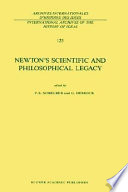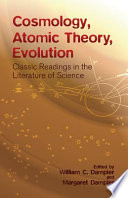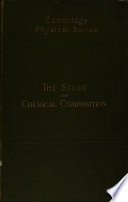 | Sir William Augustus Tilden - 1921 - 412 pages
...which by their gravity, or otherwise, are disposed to encroach upon it, at a respectful distance. . . . Chemical analysis and synthesis go no farther than...particle of hydrogen. All the changes we can produce JOHN DALTON. From Engraving by C. Turner. ARA, of Picture by J. Lonsdale. [Fact p. io(] consist in... | |
 | Eric John Holmyard - 1925 - 140 pages
...number of stars and planets cannot be infinite. 2. Atoms are indestructible and cannot be created. Chemical analysis and synthesis go no farther than...planet into the solar system, or to annihilate one 1 The second part of this book, published in 1810, was dedicated to Davy and to William Henry. The... | |
 | 1928 - 434 pages
...finite ; just as in a given space of the universe, the number of stars and planets cannot be infinite. Chemical analysis and synthesis go no farther than...All the changes we can produce consist in separating particle^ that are in a state of cohesion or combination, and joining those that were previously at... | |
 | Paul B. Scheurer, G. Debrock - 1988 - 406 pages
...particles being the products of chemical analysis. He rather compares his "atoms" with celestial bodies: No new creation or destruction of matter is within...in existence, as to create or destroy a particle of hydrogen.6" But, in order to justify his break with a tradition which required one single and same... | |
 | Helge Kragh - 1999 - 518 pages
...scientific-philosophical doctrine. John Dalton, the founder of chemical atomism, wrote in 1808 that "We might as well attempt to introduce a new planet...in existence, as to create or destroy a particle of hydrogen."61 Although progress in physics in the twentieth century indicated that hydrogen atoms can... | |
 | Tim Fulford - 2002 - 278 pages
...finite; just as in a given space of the universe, the number of stars and planets cannot be infinite. Chemical analysis and synthesis go no farther than...create or destroy a particle of hydrogen. All the Lead 29% Tin 49% Copper Brass 299 % 360 Silver 370 Iron 450 Gold 500 changes we can produce, consist... | |
 | Sir William Cecil Dampier Dampier, Margaret Dampier - 2003 - 312 pages
...cannot be infinite. Chemical analysis and synthesis go no farther than to the separation of panicles one from another, and to their reunion. No new creation...existence, as to create or destroy a particle of hydrogen. AH the changes we can produce, consist in separating particles that are in a state of cohesion or combination,... | |
 | Bill Bryson - 2003 - 562 pages
...Dalton's simple insight was that at the root of all matter are exceedingly tiny, irreducible particles. "We might as well attempt to introduce a new planet into the solar system or annihilate one already in existence, as to create or destroy a particle of hydrogen/ he wrote. Neither... | |
 | Oliver J. Thatcher - 2004 - 476 pages
...finite ; just as in a given space of the universe, the number of stars and planets cannot be infinite. Chemical analysis and synthesis go no farther than...the solar system, or to annihilate one already in eixstence, as to create or destroy a particle of hydrogen. All the changes we can produce, consist... | |
 | Ida Freund - 680 pages
...shown to them where the body has gone to, and into what it has been received." BACON, oir. 1623. " We might as well attempt to introduce a new planet into the solar system, or to annihilate one a/ready in existence as to create or destroy one particle of hydrogen." DALTON, 1808. SCIENTIFIC work... | |
| |